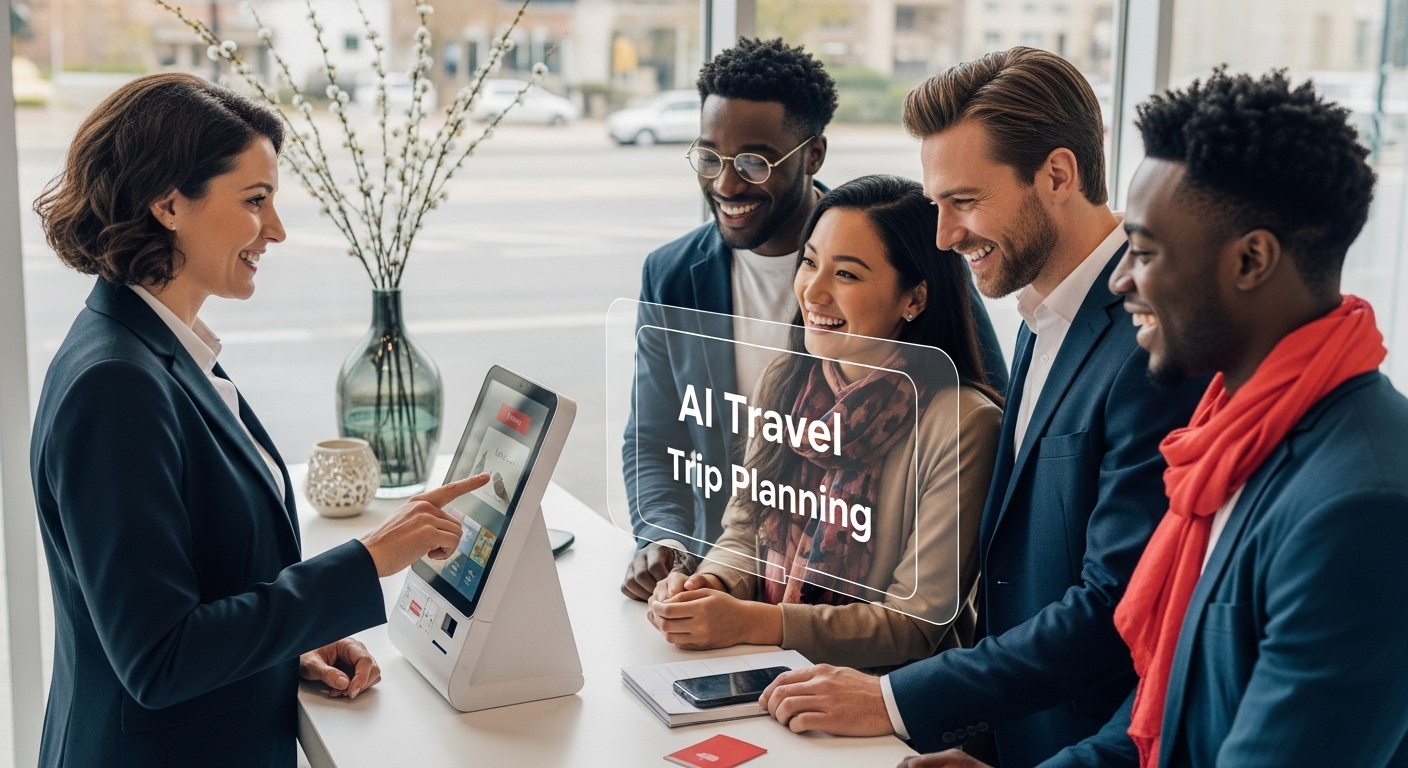AI for travel itineraries is changing how people plan trips. It slashes planning time by up to 70 percent according to recent studies. The surprising part is how these smart systems can sift through thousands of options and build a trip that seems custom made for you. Most travelers still spend hours on website research and juggling to-do lists. AI skips all that and jumps right to a trip that fits your personal style, budget, and timing down to the smallest detail.
Table of Contents
- What Is AI For Travel Itinerary?
- Why AI Matters In Travel Planning
- How AI Works In Itinerary Creation
- Key Concepts Behind AI-Driven Itineraries
Quick Summary
| Takeaway | Explanation |
|---|---|
| AI significantly reduces travel planning time. | Travelers can save up to 70% of their time when planning trips using AI technology compared to traditional methods. |
| AI customization enhances travel personalization. | Artificial intelligence adapts itineraries based on detailed traveler preferences, improving the relevance of recommendations. |
| AI solves complex travel planning challenges. | It consolidates and analyzes data instantaneously, eliminating inefficiencies associated with manual research. |
| Real-time data integration enhances itineraries. | AI uses current information about availability and pricing to create flexible, up-to-date travel plans. |
| Travelers receive uniquely tailored experiences. | By learning traveler behaviors, AI generates specific recommendations that reflect individual interests and needs. |
What is AI for Travel Itinerary?
AI for travel itinerary represents a revolutionary approach to travel planning that leverages advanced artificial intelligence technologies to transform how travelers design, optimize, and personalize their trip experiences. Unlike traditional travel planning methods that rely on manual research and static templates, AI powered travel planning adapts dynamically to individual preferences, constraints, and real time travel conditions.
Understanding AI Travel Planning Technology
At its core, AI for travel itinerary uses sophisticated machine learning algorithms and data processing techniques to generate intelligent travel recommendations. These systems analyze massive datasets including traveler preferences, destination information, transportation routes, weather patterns, local events, and real time pricing to create personalized travel plans.
The technology works by collecting and processing multiple data points about a traveler’s specific needs.
For instance, an AI system might consider factors such as:
- Preferred travel style (budget, luxury, adventure)
- Specific interests (cultural experiences, outdoor activities, culinary exploration)
- Time constraints and available budget
- Seasonal travel conditions
- Personal mobility requirements
Benefits of AI Driven Travel Planning
AI driven travel planning offers significant advantages over traditional planning methods. Research from Skift indicates that AI technologies can reduce travel planning time by up to 70% while providing more personalized and optimized itineraries.
 The system continuously learns and adapts, offering increasingly refined recommendations based on user interactions and feedback.
The system continuously learns and adapts, offering increasingly refined recommendations based on user interactions and feedback.
These intelligent systems can quickly process complex variables that would take humans significantly longer to evaluate. By integrating real time data about flight availability, hotel pricing, local transportation, and destination specific recommendations, AI travel planning tools provide travelers with dynamic, flexible, and highly personalized travel experiences that traditional planning methods simply cannot match.
Why AI Matters in Travel Planning
AI has become a game changing technology in travel planning, addressing long standing challenges that traditional methods struggled to solve. By introducing intelligent, adaptive systems, AI transforms the entire travel experience from a complex, time consuming process into a streamlined, personalized journey that meets individual traveler needs with unprecedented precision.
Solving Complex Travel Planning Challenges
Traditional travel planning often involves hours of manual research, comparing multiple websites, and piecing together fragmented information. AI eliminates these inefficiencies by consolidating and analyzing vast amounts of data instantly. This means travelers can now receive comprehensive, tailored recommendations that account for intricate details like personal preferences, budget constraints, and real time availability.
Below is a table summarizing the main challenges in traditional travel planning and how AI-driven solutions address each issue.
| Traditional Travel Planning Challenge | How AI Solves the Challenge |
|---|---|
| Information overload from multiple websites | Consolidates and analyzes data instantly |
| Time-consuming manual research and comparison | Automates research and provides comprehensive recommendations |
| Limited personalization | Learns and adapts to individual preferences |
| Difficulty finding unique experiences | Suggests off the beaten path activities based on user interests |
| Complex logistics (multi-destination trips) | Optimizes logistics and coordinates travel details automatically |
Key challenges AI helps solve include:
- Overwhelming information overload from multiple travel websites
- Time consuming manual research and comparison
- Limited personalization in traditional travel planning
- Difficulty in finding unique, off the beaten path experiences
- Complex logistics of coordinating multi destination trips
Enhancing Travel Personalization
Research from the National Science Foundation demonstrates how artificial intelligence is revolutionizing travel by enabling deeply personalized planning experiences. AI systems can now understand nuanced traveler preferences, learning from previous interactions to create increasingly refined recommendations.
For example, an AI travel planning tool can recognize that a traveler who previously enjoyed quiet mountain retreats might prefer similar nature based destinations with specific amenities. This level of personalization goes far beyond traditional recommendation engines, offering travelers experiences that feel uniquely crafted for their individual tastes and requirements.
How AI Works in Itinerary Creation
AI powered itinerary creation represents a sophisticated technological process that transforms raw travel data into personalized, intelligent travel plans. By employing advanced algorithms and machine learning techniques, AI systems can analyze complex travel variables and generate comprehensive travel experiences tailored to individual preferences.
Data Processing and Analysis
The foundation of AI itinerary creation lies in its ability to rapidly process massive datasets from multiple sources. Machine learning algorithms continuously analyze traveler data, including past travel histories, preferences, online interactions, and real time availability of travel services. These systems create intricate models that understand nuanced traveler behaviors and can predict optimal travel experiences.
Key data processing components include:
- Aggregating information from travel websites, booking platforms, and user profiles
- Analyzing historical travel trends and seasonal variations
- Integrating real time pricing and availability data
- Evaluating user feedback and interaction patterns
- Generating predictive travel recommendations
Intelligent Recommendation Generation
Research from the National Institutes of Health highlights how artificial intelligence utilizes deep learning and optimization algorithms to create intelligent travel recommendations. These advanced systems go beyond simple rule based matching, instead developing complex understanding of traveler preferences through continuous learning.
AI systems create itineraries by simulating multiple potential travel scenarios, evaluating each option against specific traveler criteria. The algorithm considers factors like travel time, budget constraints, personal interests, and logistical feasibility to generate the most suitable travel plan. This dynamic approach ensures that each itinerary is not just a generic template, but a uniquely crafted travel experience matching individual traveler expectations.

Key Concepts Behind AI-Driven Itineraries
AI driven itineraries represent a complex technological ecosystem that integrates multiple advanced computational techniques to transform travel planning. These sophisticated systems blend machine learning, predictive analytics, and intelligent decision making algorithms to create personalized travel experiences that adapt dynamically to individual traveler needs.
Foundational AI Planning Techniques
Computational intelligence forms the backbone of AI driven itinerary creation. These systems employ advanced techniques that go beyond traditional linear planning models. By utilizing complex algorithmic approaches, AI can process multiple variables simultaneously, generating travel plans that are both logically structured and deeply personalized.
This table outlines the foundational AI techniques that underpin intelligent itinerary creation, clarifying what each technique contributes to the travel planning process.
| AI Technique | Description |
|---|---|
| Multi-agent planning systems | Multiple AI agents collaborate to solve complex travel planning tasks |
| Constraint satisfaction algorithms | Ensures travel plans meet all user-defined constraints and requirements |
| Machine learning pattern recognition | Identifies and adapts to traveler behavior and preferences |
| Probabilistic decision modeling | Evaluates multiple scenarios based on likelihood and traveler priorities |
| Dynamic optimization techniques | Continuously updates plans for efficiency and personalization |
Key foundational techniques include:
- Multi agent planning systems
- Constraint satisfaction algorithms
- Machine learning pattern recognition
- Probabilistic decision modeling
- Dynamic optimization techniques
Intelligent Decision Making Frameworks
Research from MIT IBM Watson AI Lab demonstrates how advanced AI frameworks convert user travel preferences into executable planning strategies. These intelligent systems break down complex travel requirements into manageable computational tasks, analyzing potential scenarios and generating optimal itineraries that balance traveler preferences with practical constraints.
The decision making process involves sophisticated techniques like formal verification tools that ensure generated itineraries meet specific user defined criteria. This means the AI doesn’t just randomly suggest activities, but carefully constructs travel plans that align precisely with traveler expectations, considering factors like budget, time availability, personal interests, and logistical feasibility.
Discover Effortless Trip Planning with Yopki’s AI
Are you tired of piecing together travel plans the old way? The article highlighted how AI-powered itinerary creation can save you time and reduce the overwhelm that comes from sorting through endless travel options. Traditional planning often means dealing with information overload or worrying your trip will not match your unique interests. With Yopki, you can say goodbye to travel stress and let modern AI instantly build the trip you actually want.

Why wait to experience smarter travel planning? Take control with Yopki’s intuitive platform that generates your custom itinerary, organizes your days on a map, and keeps every ticket or booking in one convenient hub. Ready to enjoy a trip planned around you? Start creating your seamless travel experience now with Yopki’s all-in-one web app.
Frequently Asked Questions
What is AI for travel itinerary planning?
AI for travel itinerary planning refers to advanced technologies that leverage artificial intelligence to help individuals create, optimize, and personalize travel experiences, adapting to individual preferences and real-time conditions.
How does AI enhance the personalization of travel itineraries?
AI enhances personalization by analyzing various data points related to traveler preferences, interests, budget, and time constraints. This allows AI systems to provide tailored recommendations that match individual tastes and needs.
What are the benefits of using AI in travel planning compared to traditional methods?
Using AI in travel planning can reduce planning time by up to 70%, provide more personalized itineraries, and quickly process complex variables that traditional methods would struggle to handle, leading to a streamlined and efficient planning experience.
How does AI process data to generate travel recommendations?
AI systems process data by aggregating information from various sources, analyzing user behavior, evaluating historical travel trends, and integrating real-time pricing and availability. This enables them to generate intelligent recommendations tailored to individual preferences.



